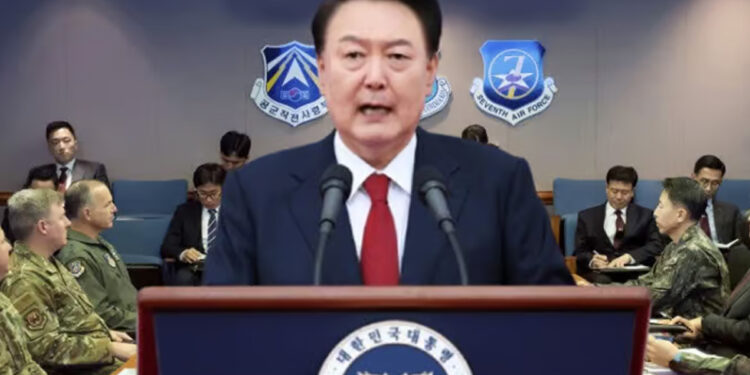In a surprising late-night televised address, South Korean President Yoon Suk Yeol announced the imposition of martial law across the country, citing it as crucial to ending the influence of anti-state forces sympathetic to North Korea. This marks the first time in over four decades that martial law has been declared in South Korea, a democratic nation that has long prided itself on its political stability and democratic institutions.
What Martial Law Means for South Korea
The imposition of martial law has far-reaching consequences for South Korean governance. Under the new decree, political party activities and parliamentary operations will be suspended, effectively halting the functions of the legislative branch. Additionally, the media will come under the control of the military, severely restricting press freedom and information flow.
President Yoon’s decision comes amid a tense political climate, with growing opposition to his administration. In his speech, Yoon accused certain political factions of destabilizing the country by working in alliance with pro-North Korean forces. He also mentioned the impeachment attempts against high-ranking officials and the rejection of key budget proposals as critical factors that necessitated this drastic action.
The Backlash and Opposition Response
Yoon’s declaration of martial law has sparked outrage both domestically and internationally. Political leaders, including Han Dong-hoon, the leader of Yoon’s own conservative party, have voiced strong opposition, labeling the move as “wrong” and counterproductive to the country’s democratic principles.
Lee Jae-myung, the leader of the opposition Democratic Party, strongly condemned the decision, warning that the imposition of martial law could potentially lead to a military dictatorship and trigger a severe economic collapse. Lee called on citizens to take action and gather at the National Assembly in protest against what he called an authoritarian move.
In response, President Yoon defended his decision, arguing that martial law was necessary to protect constitutional order and prevent the country from descending into a political crisis. He pointed to the actions of opposition parties as evidence that the nation’s stability was at risk.
A Divided Nation: South Korea’s Struggle with Domestic Politics
South Korea has long been a vibrant democracy, but the political situation has become increasingly polarized in recent years. The ongoing conflict between the conservative government under President Yoon and the liberal opposition has escalated, particularly over the handling of national security, the economy, and relations with North Korea.
Tensions have been particularly high in recent months due to the opposition’s growing resistance to government policies, including the budget proposal and efforts to hold top officials accountable. This has led to a standoff between the ruling administration and opposition forces, culminating in the controversial martial law declaration.
South Korea’s Tense Relationship with North Korea
The declaration of martial law occurs against the backdrop of the ongoing Cold War on the Korean Peninsula. Following the division of the Korean Peninsula after World War II, South Korea and North Korea have remained bitter rivals. The Korean War, which began in 1950, ended in an armistice rather than a peace treaty, leaving both nations technically still at war.
Over the decades, tensions between the two nations have been exacerbated by North Korea’s pursuit of nuclear weapons, which has been vehemently opposed by South Korea and its allies, particularly the United States. The region has witnessed several military skirmishes, provocations, and missile tests over the years, contributing to an environment of persistent instability.
Despite occasional efforts at diplomacy, such as the historic summits between Kim Jong-un and former South Korean President Moon Jae-in in 2018, the prospects for lasting peace have remained elusive. The military threats, nuclear concerns, and ideological divides continue to shape the volatile relationship between the two Koreas.
The Future of South Korea’s Democracy
As South Korea navigates this crisis, many are left wondering about the future of the nation’s democracy. The imposition of martial law is a historic and contentious decision, with critics warning that it could set a dangerous precedent for authoritarian rule. On the other hand, President Yoon argues that the move is necessary to safeguard the nation’s constitutional integrity and prevent political forces from destabilizing the government.
For now, the political battle lines are firmly drawn, and South Korea stands at a critical juncture in its history. The outcome of this conflict will likely shape the nation’s future trajectory, as it grapples with internal divisions and external threats from its northern neighbor, North Korea.
Conclusion
South Korea’s unexpected imposition of martial law by President Yoon Suk Yeol has sent shockwaves through the nation and the wider region. As political parties and media face unprecedented restrictions, the nation is left to ponder the future of its democratic institutions. The unfolding political crisis, fueled by deep divisions between the government and opposition, is further complicated by the ever-present threat posed by North Korea. Only time will tell how South Korea navigates this turbulent period in its history.







